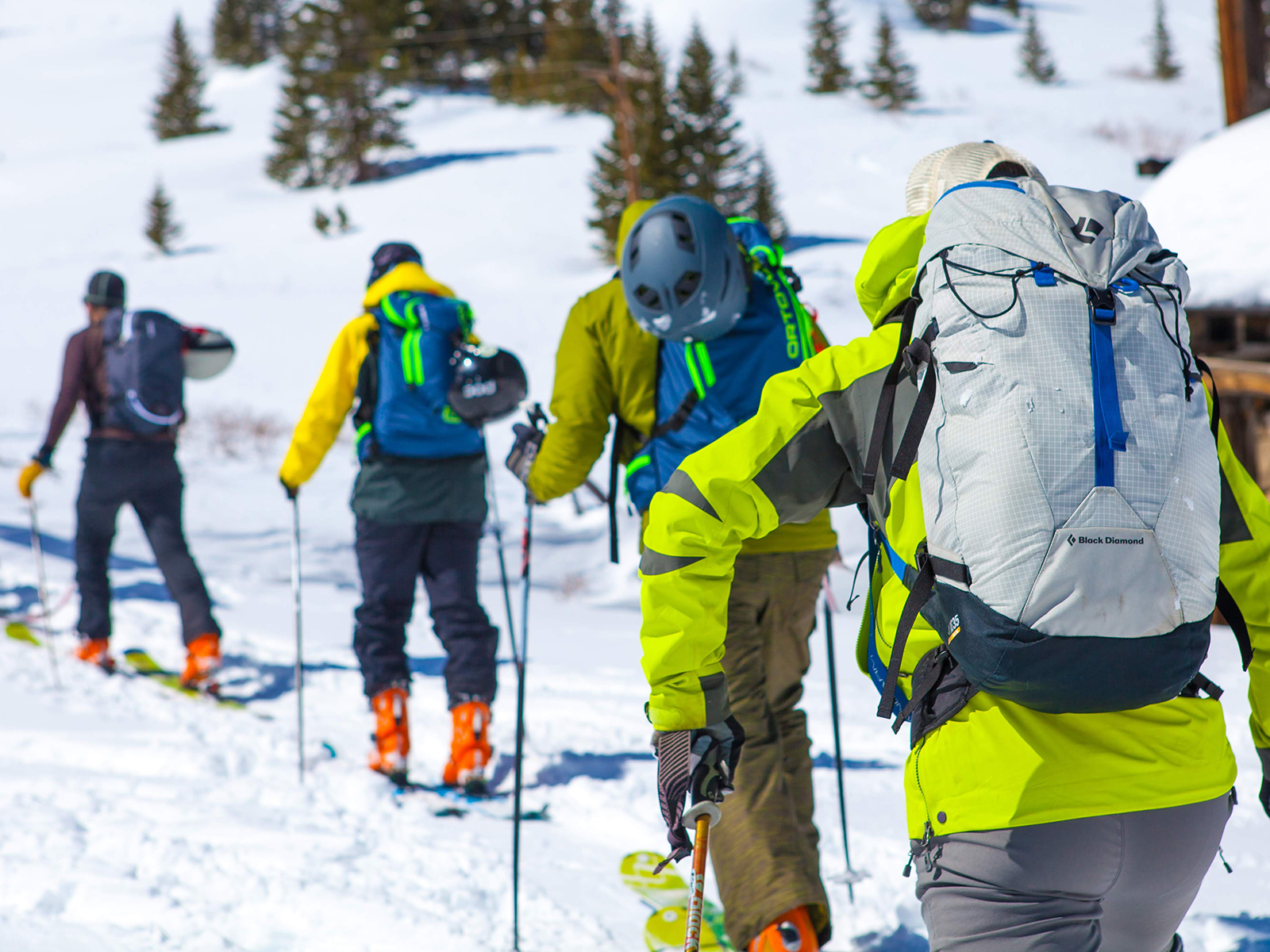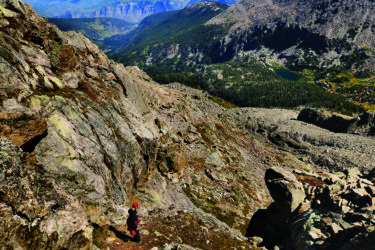The Local newsletter is your free, daily guide to life in Colorado. For locals, by locals.
When I first moved to Colorado eight winters ago, my friend Jason introduced me to backcountry skiing. He took me on my first hut trips, taught me how to travel responsibly through avalanche terrain, and generally instilled in me a healthy respect for the sundry ways I could perish in the mountains in the winter (a respect I hold to this day).
This—an adventurous and patient friend—is how most people get into the backcountry. But not everyone has a Jason.

“People who want to learn to backcountry ski have a lot of barriers to entry,” says Jeff Woodward, Denver-based tech entrepreneur and lifelong skier. “Unless you know someone who’s willing to mentor you, it’s very challenging to just try it…There’s the fact that if you do go out of bounds, you’re putting yourself in dangerous terrain. The economics of it are also pretty staggering: hiring a guide is expensive, taking [an avalanche] course is expensive, renting equipment is expensive.”
(Read our guide on how to safely get into backcountry skiing)
This is why Woodward and his friend, Erik Lambert, have founded a program called Bluebird Backcountry. Their longterm vision is a backcountry ski area that is avalanche-mitigated and ski-patrolled, and has some creature comforts (like warming huts and an après spot), but is entirely human-powered (read: no chairlifts).
“What we imagine is that this would be somewhere halfway between the resort experience and the true backcountry experience,” says Lambert. “It’d allow people to begin to see what a true backcountry experience tastes like, to get educated, and to work on their skills so they can build up toward being ready to be out there.”
Currently, Bluebird Backcountry is best described as a pilot program. In March, it ran its first two prototyping weekends on Mosquito Pass, south of Breckenridge. Over four days, with guides from the Colorado Mountain School, Bluebird took 100 participants out for a beginner-friendly backcountry experience that included a two-mile skin in to a base camp, a couple laps of skiing, and a primer on how to use backcountry equipment.
The response was positive, says Lambert, who is also the founder of Bonfire Collective, a creative agency in Golden. “It was amazing to see how accomplished people felt at the end.” Thirty-five of the participants were first-timers. Bluebird volunteers recorded over 300 observations over the four days, leading to 44 changes to improve the overall experience. At the second weekend, participants skied out to a campfire in the parking lot, where après and high fives were waiting for them. “We had a bunch of people cheering for the people who were coming out [more] slowly, and that made people feel awesome,” says Lambert.
Bluebird has actually been in the works since 2016. Woodward got the idea after he took his younger brother backcountry skiing for the first time outside of Crested Butte. “He was totally overwhelmed by the views, and by the end of the day, he was like, ‘Can I just buy these skis?’ He loved it. But he never would have tried it if I wasn’t obsessed with the sport.” Woodward recruited Lambert and the two began spending a few hours a week doing market research, through which they determined there was a need for a more welcoming and educational place to learn how to backcountry ski.
According to Snowsports Industries America (SIA), backcountry skiing is the fastest-growing segment of the ski industry. For the 2018–19 season, sales of alpine touring bindings and boots grew by 33 percent and 72 percent, respectively, compared to alpine (downhill) bindings and boots, which grew at 19 percent and 7 percent, respectively. And Woodward thinks Colorado—which, according to SIA, has the second-highest rate of skiers per capita in the U.S., at 11.7 percent—is a particularly good place to try something like Bluebird. “The popular backcountry spots [near Denver] are not just packed on weekends, but weekdays,” he says. “But the demand for wanting to learn this stuff is growing faster than mentorship can supply.”

The Mosquito Pass weekends, Bluebird Backcountry’s first on-snow experience (priced at $50 a person), sold out in 10 days. Even more compelling, an online survey Woodward and Lambert designed has elicited more than 2,300 responses to date, with 93 percent of respondents said they were interested in the concept of a backcountry ski area (58.9 percent “loved” the idea). The survey (which you can find on the Bluebird Backcountry website) also told them what motivated people to go backcountry skiing: “[avoiding] crowds,” “snow,” and “exercise” were top reasons.
Bluebird is running a second prototype weekend in Winter Park this Saturday and Sunday. The 200 acres of the Winter Park side of the resort, which is now closed for the season, will be open to just the 50 Bluebird participants each day (regular downhill ski operations will continue running on the Mary Jane side). This time, participants can either choose to tour the mountain themselves, or join clinics where they’ll learn skills like how to transition between uphill and downhill modes, how to skin efficiently, and how to use beacons.
As many positive signs as there are, Woodward and Lambert know there are some big hurdles to overcome to open a ski area. The obvious: land. “There are three potential ways of getting land, and none of them are easy,” says Woodward. The vast majority of ski resorts lease U.S. Forest Service land, with a special use permit. But the Forest Service hasn’t granted one of those permits since 1981, he says. Another option would be to partner with a resort whose ski area boundary is smaller than its permitted area—Winter Park is an example. Finally, Bluebird could purchase a block of private land, but “you can imagine there aren’t that many ski areas within two hours of Denver that are privately owned,” Woodward says.
Beyond the challenge of obtaining property, however, what Bluebird wants to attempt actually isn’t unheard of. The Hankin Evelyn Recreation Area in British Columbia already runs a backcountry ski area. It doesn’t do avalanche mitigation, and is largely run by volunteers. But it’s a similar concept, with cut trails, skin tracks instead of chairlifts, and warming huts. There’s also the success of Colorado’s Silverton Mountain, which offers advanced and expert-level hike-to terrain off a single chairlift; and requires skiers to carry beacons, probes, and shovels.
From a safety perspective, “the presence or absence of chairlifts doesn’t change the challenges of the snow safety team where you really want to mitigate the risk from natural and human triggered avalanches,” says Brian Lazar, deputy director for the Colorado Avalanche Information Center (CAIC), who has done some consulting work for ski resorts. “The strategies for mitigating the avalanche risk would be similar [to a resort with lifts]…Ski patrols all over the world do it.”
In terms of liability, Bluebird would likely have to employ similar risk management protocols that traditional resorts use, says David Byrd, director of risk and regulatory affairs for the National Ski Area Association. These would include having ski patrol and other emergency medical personnel on staff, insurance, waivers—which Byrd says are “strongly enforceable” in Colorado—and crucially, guest education. “In the backcountry and ski areas, educating guests is number one tools for mitigating injuries,” he says. What a ski area like Bluebird would brief guests on: skiing in pairs, watching out for tree wells and, of course, avalanche awareness.

For now, Woodward and Lambert aren’t putting a timeline on when Bluebird will flip from prototype to the real deal. But they plan to work hard on this project over the summer—alongside their full-time jobs, of course.
“Both Jeff and I are people who want to share amazing experiences rather than hoard them,” Lambert says. “People are looking for that more wild way to engage with nature and to engage with skiing…We feel that skiing has lost a little bit of its soul. And I hope that Bluebird can kind of put the soul back into skiing.”
If you go: There are still spots available for Bluebird Backcountry’s second prototype weekend in Winter Park on April 27 and 28. No backcountry experience is necessary.








